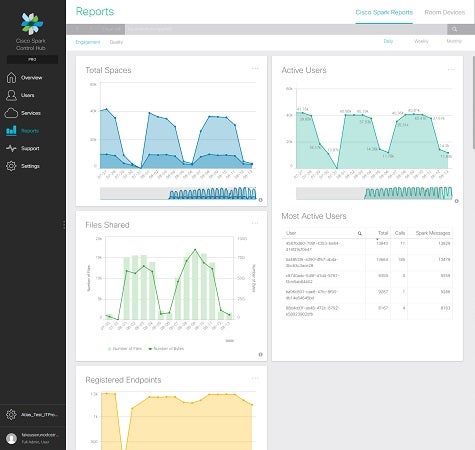Because most of the widely employed collaboration applications are delivered as a cloud service, the average IT organization doesn’t have a lot of control over how those services get used. Aiming to provide IT organizations with the control needed to comply with any number of compliance regulations, Cisco announced today it is making available an update to the Cisco Spark collaboration service.
The latest Cisco Spark update, among other capabilities, adds the ability to encrypt all communications occurring across the platform alongside a variety of new compliance controls, including support for assigning a personal identification number (PIN) to devices accessing the service regardless of who own the device being employed.
In addition to improving security and compliance, Cisco has enhanced the analytics tools it makes available to help IT organizations, for example, to identify both the location of any end user and potential bottlenecks that might be adversely affecting the overall collaboration experience.
Jens Meggers, senior vice president and general manager for cloud collaboration at Cisco, says via a new Cisco Spark Control Hub, an IT administrator can now address security, compliance and performance issues in a single console, including e-discovery tools for searching data that is more than 90 days old. In fact, Meggers says, providing those capabilities is key to how Cisco differentiates itself from rival platforms that were primarily developed for consumers rather than corporate environments.
“We think early on, collaboration was a line of business decision,” says Meggers. “But now we see CIOs and IT becoming much more involved.”
Driving that shift, says Meggers, is a need for organizations to make sure their communications are secure at a time when sensitive data is now routinely shared via collaboration platforms. Via Cisco Spark, IT organizations can now wipe data clean from any mobile device.
To further ensure that security is maintained, Meggers says Cisco is now also giving IT organizations the option to store encryption keys on-premises rather than in the Cisco Spark cloud. Should the Cisco Spark cloud service ever be hacked, the data being accessed would be useless without the keys required to decrypt it, notes Meggers.
Cisco via this update is also making available a Pro Pack for Cisco Spark that makes it simpler to integrate third-party applications with Cisco Spark using a previously published application programming interface (API). Vendors that have already built connectors for Pro Pack include Actiance, Global Relay, Symantec and Okta. Cisco has also developed a connector between Cisco Spark and Cisco Cloudlock, a data loss prevention (DLP) that Cisco acquired last year.
There’s no doubt these days that cybercriminals are becoming more sophisticated in terms of the types of attacks they launch. Many of them are specifically hunting for intellectual property (IP) that commands much higher premiums on black markets than a bunch of random credit card numbers. The real challenge facing IT organizations is how to secure the communications involving that IP without disrupting the processes that maximize its value.



